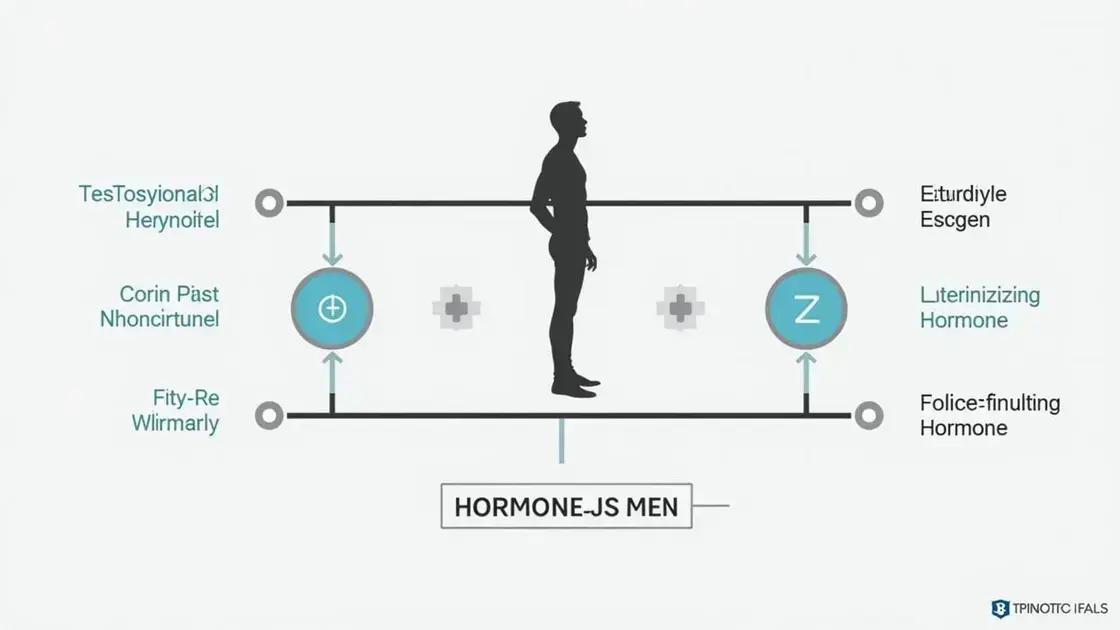Erectile dysfunction (ED) can occur even with normal hormone levels due to various factors such as physical health conditions, psychological issues, and lifestyle choices. Common causes include heart disease, diabetes, stress, and anxiety. Treatment options like lifestyle changes, medications, and therapy are available, and seeking medical advice is essential for appropriate management.
Erectile dysfunction is a prevalent issue that affects many men, often causing anxiety and confusion. You might wonder, can erectile dysfunction occur with normal hormone levels? This question points to a deeper understanding of sexual health and the factors influencing erectile function. In this post, we will explore the connection between hormone levels and erectile dysfunction, shedding light on various causes that may not be immediately obvious. Join us as we delve into what every man should know about this complex issue.
Understanding Erectile Dysfunction

Erectile dysfunction (ED) is the inability to achieve or maintain an erection suitable for sexual intercourse. This condition affects many men and can be influenced by various factors beyond just hormone levels.
What is Erectile Dysfunction?
ED can occur at any age, but it is more common in older men. It is important to understand that experiencing erectile issues occasionally is normal, but persistent problems may indicate an underlying health concern.
Physical and Psychological Factors
Several physical factors can contribute to erectile dysfunction. These may include:
- Diabetes: High blood sugar levels can damage blood vessels and nerves, affecting erection.
- Heart Disease: Reduced blood flow due to cardiovascular issues can prevent an erection.
- Obesity: Body weight can play a role in hormonal balance and vascular health.
- Medications: Some prescriptions can have side effects that include ED.
Additionally, psychological factors such as stress, anxiety, and depression can also lead to or worsen ED. Understanding that both body and mind play a role is crucial in addressing this condition.
Importance of Communication
Discussing erectile dysfunction with a partner and healthcare provider is an important step. Open conversation can alleviate anxiety and help in seeking appropriate treatment.
Overall, understanding erectile dysfunction involves acknowledging how various factors interplay. It’s important to gather information and seek help to manage and overcome this common sexual health issue.
Normal Hormone Levels Explained

Normal hormone levels play a vital role in overall male health, including sexual function. Key hormones that influence erectile function include testosterone, estrogen, and other related hormones. Understanding these levels is essential for identifying the causes of erectile dysfunction.
Testosterone Levels
Testosterone is the primary male sex hormone. It is essential for developing male characteristics and plays a significant role in libido and erectile function. Normal testosterone levels generally range from 300 to 1,000 ng/dL. Levels below this range may lead to decreased sexual desire and erectile issues.
Estrogen Levels
Though often considered a female hormone, estrogen is also present in men. It helps regulate libido and contributes to overall sexual health. Normal estradiol levels in men should be between 10 to 40 pg/mL. Low or high levels can lead to sexual dysfunction.
Other Hormones
Several other hormones also influence erectile function. Luteinizing hormone (LH) and follicle-stimulating hormone (FSH) help regulate testosterone production. Normal LH levels range from 1.24 to 7.8 IU/L and FSH levels from 1.5 to 12.4 IU/L.
Hormonal Balance
It’s important to note that hormonal balance is vital. Having normal levels of testosterone and estrogen alone does not guarantee sexual health. Factors such as stress, anxiety, and lifestyle choices can also affect how these hormones impact erectile function.
Understanding normal hormone levels is crucial in examining sexual health. Testing and monitoring these levels can provide insights into potential causes of erectile dysfunction and help inform treatment options.
Causes of Erectile Dysfunction

Erectile dysfunction (ED) can arise from various causes, which can be broadly categorized into physical and psychological factors. Understanding these causes is essential for identifying potential treatments.
Physical Causes
Several health conditions can contribute to ED, including:
- Heart Disease: Poor blood circulation can impede blood flow to the penis, causing erectile issues.
- Diabetes: High blood sugar can cause nerve and blood vessel damage, leading to difficulties in achieving an erection.
- Obesity: Excess weight can impact hormone levels and blood flow, increasing the risk of erectile dysfunction.
- High Blood Pressure: This condition can cause reduced blood flow, making it difficult to maintain an erection.
- Neurological Disorders: Conditions such as multiple sclerosis and Parkinson’s disease can affect nerve signals from the brain to the penis.
- Hormonal Imbalances: Low testosterone levels or other hormonal issues may lead to decreased libido and erection problems.
Psycho-Emotional Causes
Psychological factors also play a significant role:
- Stress: Work-related or personal stress can lead to performance anxiety, making it hard to relax during sex.
- Anxiety: Fear of sexual performance can hamper the ability to achieve an erection.
- Depression: Mental health issues can reduce interest in sex and affect erectile function.
- Relationship Problems: Poor communication or unresolved conflicts can negatively impact sexual intimacy.
Both medical and psychological factors can interact, further complicating the situation. Addressing the root causes is necessary for effective treatment and management of erectile dysfunction.
When to See a Doctor

It’s important to know when to seek medical advice regarding erectile dysfunction (ED). While occasional difficulties may be normal, certain situations warrant a visit to a healthcare provider.
Persistent Issues
If you experience ongoing trouble achieving or maintaining an erection over a period of several weeks or months, it’s time to see a doctor. This can indicate an underlying health issue that needs to be addressed.
Medical Conditions
If you have existing health conditions, such as diabetes, heart disease, or high blood pressure, regular check-ups are essential. ED can be a sign that these conditions are not well managed, and early intervention is critical.
Psychological Concerns
Experiencing feelings of anxiety, depression, or significant stress related to sexual performance may benefit from professional help. A healthcare provider can guide you towards appropriate mental health resources.
Impact on Relationships
If erectile dysfunction is affecting your relationship or causing significant distress, this is another reason to seek help. Addressing the issue can improve both your sexual health and your emotional connection with your partner.
Side Effects of Medication
If you suspect that your medications might be causing ED, discussing this with your doctor is important. They can evaluate your medications and adjust them if necessary.
Don’t hesitate to open up about your concerns. Talking to a healthcare provider can provide you with valuable insights and treatment options that can improve your quality of life.
Treatment Options Available

When it comes to treating erectile dysfunction (ED), several options are available. These treatments can vary based on the underlying cause of ED, age, and overall health. Below are some common treatment options:
Lifestyle Changes
Making healthy lifestyle changes can significantly improve erectile function. This includes:
- Exercising Regularly: Physical activity can improve blood flow and boost heart health.
- Healthy Diet: Eating a diet rich in fruits, vegetables, and whole grains can support overall health.
- Reducing Stress: Engaging in relaxation techniques like yoga or meditation can help.
- Quitting Smoking: Smoking can damage blood vessels, which impairs blood flow.
- Limiting Alcohol: Excessive drinking can negatively affect sexual performance.
Medications
Several medications are available to help with erectile dysfunction. These work by increasing blood flow to the penis. Common options include:
- Phosphodiesterase Type 5 Inhibitors: Such as Viagra, Cialis, and Levitra.
- Hormone Replacement Therapy: If low testosterone is the issue, your doctor may recommend hormone therapy.
Therapy
Psychological counseling can be effective, particularly if the ED is rooted in emotional or psychological factors. A therapist may help address issues like anxiety, depression, or relationship difficulties.
Devices and Procedures
Other treatments include mechanical devices or surgical options:
- Vacuum Devices: These create a vacuum to draw blood into the penis.
- Peyronie’s Disease Treatments: For men with curvature of the penis, specific treatments can help.
- Penile Implants: This surgical option may be recommended for severe cases.
Your healthcare provider can guide you through these options and help you find the best treatment plan for your specific needs.
In Conclusion, Understanding Erectile Dysfunction
Erectile dysfunction (ED) is a complex issue that many men face, and it can occur even with normal hormone levels. Recognizing the various factors that contribute to ED, such as physical health, psychological well-being, and lifestyle choices, is crucial in addressing the problem effectively.
With a range of treatment options available—including lifestyle changes, medications, therapy, and other medical interventions—it’s essential to have open discussions with healthcare providers. This dialogue can lead to identifying the most appropriate course of action tailored to individual needs.
Whether through improving health habits, seeking professional help, or exploring medication, taking the first step towards treatment can significantly enhance quality of life and restore confidence.
In summary, don’t hesitate to reach out to a doctor if you’re experiencing issues, as early intervention can lead to better outcomes and help you regain control over your sexual health.
FAQ – Frequently Asked Questions about Erectile Dysfunction
What is erectile dysfunction?
Erectile dysfunction (ED) is the inability to achieve or maintain an erection sufficient for sexual intercourse. It can happen occasionally or frequently.
Can erectile dysfunction occur with normal hormone levels?
Yes, erectile dysfunction can occur even if hormone levels are normal. Many factors, including psychological issues and physical health, can contribute to ED.
What are some common causes of erectile dysfunction?
Common causes include heart disease, diabetes, obesity, stress, anxiety, and certain medications. Both physical and psychological factors can play a role.
When should I see a doctor about erectile dysfunction?
You should see a doctor if you experience persistent difficulties with erections, if you have existing health conditions, or if ED impacts your relationships.
What treatment options are available for erectile dysfunction?
Treatment options include lifestyle changes, medications, psychological counseling, vacuum devices, and penile implants. A healthcare provider can recommend the best option based on your situation.
Are there lifestyle changes that can help with erectile dysfunction?
Yes, regular exercise, a healthy diet, quitting smoking, limiting alcohol, and managing stress can significantly improve erectile function.













